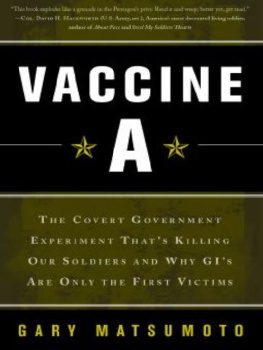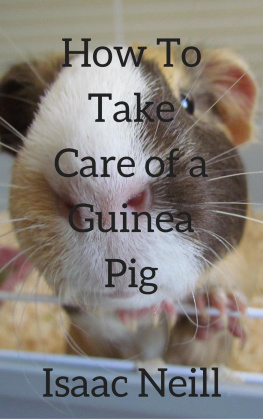Table of Contents
Praise for Gary MatsumotosVaccine A
A shocking expos of experimenting with anthrax
vaccine on unsuspecting members of the military. Investigative
journalism at its best. A must read for any concerned citizen.
JAMES C. GOODALE, former Vice Chairman, New York Times
Persuasive.... Matsumoto provides irrefutable information
from wars before the U.S. invasion of the Persian Gulf during
1990 that military personnel have served as unwitting
guinea pigs in medical experiments.
The Denver Post
Superb... a must-read for those facing the potentially
fatal shotsas well as for future care-providers for any vet
survivors who unfortunately end up suffering from the long-term
effects and debilitating diseases associated with the vaccine.
Sun-Sentinel
While it seems unimaginable that serving soldiers
would be used as guinea pigs, Matsumotos impeccable
research proves it. A book to read and raise awareness
that these abuses might appear here.
The Southland Times (New Zealand)
A vitally important book... Send copies to every
member of Congress. Demand we stop such experiments
on our men and women in uniform.
MilitaryCorruption.com
For the men and women in the armed forces of
the United States and the United Kingdom
and for my daughter Helen
Introduction
This is a book that the U.S. Department of Defense does not want you to read. It is about human medical experimentationnot that undertaken by the Japanese and Nazi doctors of World War II more than sixty years ago, but human experimentation being conducted on U.S. citizens by U.S. doctors and scientists working for the U.S. military. You may be familiar with some of the more shameful medical episodes in American historythe Tuskegee syphilis trials conducted by the U.S. Public Health Service or the Cold War LSD experiments conducted by the CIA. But this book is not about the past, except as the past is also prologue to our present and future. The unethical experiments detailed in this book are ongoing, with little prospect of being self-limiting. Why? Because they have been shielded from scrutiny and public accountability by national security concerns.
The victims of this story are the young men and women who volunteered for the U.S. armed forces, fully recognizing that they might be asked to risk their lives in battle and found themselves, without their knowledge or permission, the subjects of dangerous medical experimentation. Clinical evidence now exists that military doctors in both the United States and Britain have been testing a new anthrax vaccine on soldiers who werent told they were getting an unlicensed immunization, let alone one that contains a substance shown in peer-reviewed scientific literature to be capable of causing incurable if not fatal disease. The justification for this secret experimentation was intelligence that Saddam Hussein had biological weapons that he might use if the war went against him. While Saddam had plans, if not an ongoing program, to develop a nuclear weapon, and certainly once had and indeed used chemical weapons, a sad irony of this story is that after years of U.N. inspections and now a war that has put Saddam Hussein behind bars, no samples of Iraqi dried anthrax have yet been discovered.
Following its stellar performance in the first Gulf War, the Afghan invasion and second war against Iraq, our nations military establishment reached a level of popularity unseen since the years following World War II, in the process acquiringthe Abu Ghraib prison scandal asidea patina of infallibility. This book will argue that the military has used public goodwill to shut off debate on a matter of vital interest to all Americans. I will show what can happen when the military is allowed to fend off criticism with national security claims and by equating criticism with disloyalty. Like any institution, the Department of Defense is as flawed and fallible as the humans who fill its ranks, and so the public must not assume that the DOD will always act honorably and with integrity because humans do not. Some will say that such talk is un-American. But I maintain that dissent against the abuse of power is one of this countrys proudest traditions. It is a privilege that Americans have given their lives for, and one that we neglect at our own peril.
In 1990, when the United States launched Operation Desert Shield and then Desert Storm, I was an NBC correspondent covering the war from Saudi Arabia. Although the term was not yet used, I would become an embedded journalist for the ground offensive. Like the soldiers I covered, I was fully warned about the risk that the other side might employ biological or chemical warfare weapons. I had my protective gear and pills to take in the event of a nerve agent gas attack.
Fortunately, we won that war rather quickly. The air assault took little more than a month and the ground war ended in just four days. The Iraqi troops were simply no match for U.S. military power, and the Mother of All Battles that Saddam Hussein had threatened never materialized. As a result, American casualties were phenomenally low in comparison to those suffered in any other war in U.S. history. Sadly, many of the casualties that did occur were the result of friendly firewe mistakenly hurt our own. But Saddam never put his dreaded biological and chemical weapons into play.
A little more than a year or so after wars end, reports began to emerge about a strange malady afflicting returning veterans. The symptoms were often vague, many subjective, but remarkably consistentaching joints and muscles, rashes, fatigue, weight loss, weight gain, hair loss, sore gums, diarrhea, nausea, swelling of hands and feet, short-term memory loss and headaches. Of course, taken individually, these symptoms could each be attributed to a myriad of possible causes. Yet even grouped together they still did not add up to a recognizable disease, according to military doctors.
When people are scared, or in pain, as these GIs clearly were, when everyone is wondering who will be the next to be robbed of his or her meaningful life by crippling illness, rumors invariably abound. Because I am not, by temperament or training, the type of person to be caught up in idle rumor, my attention was caught not by the rumors themselves but by the military response to one of them, that a nerve agent might be the source of these complaints. Around 1997, the CIA and the military suggested a scenario that seemed to confirm these suspicions. It allowed for possible injury to about 100,000 troops, by remarkable coincidence almost precisely the number of Gulf War veterans who were registered as ill at the time.
The scenario went as follows: A U.S. Army engineering battalion inadvertently released a plume of nerve agent when it blew up an Iraqi ammunition dump at a place called Khamisiyah stocked with chemical munitions. If you read between the lines the subtext was clear: it was really Saddams fault; he should not have been storing nerve agent. All this sounded quite plausible, except to those of us the military had trained to identify a chemical attack. The consequences we had been taught to look for in no way matched the symptoms the sick GIs were experiencing.
The militarys own scientific literatureresearch with nerve agents tested on both animals and humans and published decades earlieralso undermined the idea that nerve agents released into the open air could cause the symptoms Gulf War veterans were reporting. Eventually, the militarys own epidemiologists published data that further discredited the nerve agent theory, and angry senators censured both the Army and the CIA for releasing highly speculative, spurious information. The GAO has recently published a report saying there was no sound basis for the Khamisiyah theory.












